|
|
|
Sort Order |
|
|
|
Items / Page
|
|
|
|
|
|
|
| Srl | Item |
| 1 |
ID:
164373
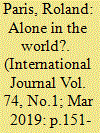

|
|
|
|
|
| Summary/Abstract |
Canada has found itself in serious diplomatic disputes over the past year with Saudi Arabia and China. The Saudis took issue with the Canadian foreign minister’s call to release human rights activists from prison, whereas China was angry at Canada’s arrest of a senior Chinese executive on an extradition request from the United States. These incidents should not be viewed as isolated aberrations. Authoritarian regimes seem increasingly emboldened to lash out at countries that displease them, including allies of the United States. But Ottawa has succeeded in rallying considerable international support for its position in the China dispute, suggesting that while Canada may be exposed, it is not destined to be alone
|
|
|
|
|
|
|
|
|
|
|
|
|
|
|
|
| 2 |
ID:
135096
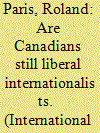

|
|
|
|
|
| Summary/Abstract |
Since coming into office in 2006, the government of Prime Minister Stephen Harper has rejected many of the symbols and practices of the liberal internationalist approach to foreign affairs that Canadian governments of all political stripes broadly embraced during the preceding six decades. As part of this change, the Harper government has also promoted a new narrative about Canada’s history and foreign policy, which encourages Canadians to change how they think about their country and its role in the world. By examining recent opinion surveys, this article asks whether Canadian public attitudes on foreign policy have shifted away from liberal internationalism and toward the Harper government's narrative since 2006.
|
|
|
|
|
|
|
|
|
|
|
|
|
|
|
|
| 3 |
ID:
053321


|
|
|
|
|
| Publication |
Cambridge, Cambridge University Press, 2004.
|
| Description |
xi, 289p.
|
| Standard Number |
0521541972
|
|
|
|
|
|
|
|
|
|
|
|
Copies: C:1/I:0,R:0,Q:0
Circulation
| Accession# | Call# | Current Location | Status | Policy | Location |
| 048419 | 327.172/PAR 048419 | Main | On Shelf | General | |
|
|
|
|
| 4 |
ID:
075357
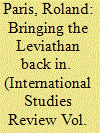

|
|
|
|
|
| Publication |
2006.
|
| Summary/Abstract |
There are crucial differences between classical and contemporary conceptions of the liberal peace thesis, or the proposition that liberally constituted states tend to be more peaceful in domestic affairs, in their relations with other states, or both. Classical liberals such as Locke and Kant believed that peace depended not only on liberal political and economic arrangements but also on a functioning state apparatus, capable of upholding the rule of law and containing societal competition within peaceful bounds. By contrast, modern liberal peace scholars have tended to treat functioning state institutions as a given, focusing instead on the relationship between violent conflict and different types of (already constituted) regimes. As a result, findings from modern scholarship do not necessarily apply to states just emerging from civil wars with damaged, dysfunctional, or nonexistent governmental institutions. Given the abundance of post-conflict peacebuilding operations and failed or failing states in the world today, liberal peace scholars would do well to revisit classical liberalism's dual emphasis on building liberal and effective states as a foundation for peace.
|
|
|
|
|
|
|
|
|
|
|
|
|
|
|
|
| 5 |
ID:
095442
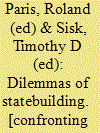

|
|
|
|
|
| Publication |
London, Routledge, 2009.
|
| Description |
xii, 366 p.
|
| Series |
Security and governance series
|
| Standard Number |
9780415776288, hkp
|
|
|
|
|
|
|
|
|
|
|
|
Copies: C:1/I:0,R:0,Q:0
Circulation
| Accession# | Call# | Current Location | Status | Policy | Location |
| 054952 | 327.172/PAR 054952 | Main | On Shelf | General | |
|
|
|
|
| 6 |
ID:
184961
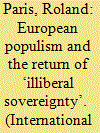

|
|
|
|
|
| Summary/Abstract |
European populist leaders and movements often extol the virtues of sovereignty, but how exactly are they using this term? Scholars have typically relied on conventional understandings of the concept—Westphalian, popular and national sovereignty—to interpret populist discourses, but some have noted that these categories seem inadequate. This article asks whether much older, long overlooked, versions of sovereignty might help to explain the sovereignty discourse of European populists. These older variants include extralegal sovereignty (a leader's power to act outside the constraints of formal rules) and organic sovereignty (the power of a political community understood as a single ‘organism’). Both are inherently illiberal: extralegalism rejects constitutionalism, while organicism is inimical to political pluralism. An examination of the public speeches and statements of one prominent European populist leader, Prime Minister Victor Orbán of Hungary, reveals that he has, indeed, invoked these illiberal versions of sovereignty. By retrieving these older concepts, populists gain a powerful rhetorical tool to advance illiberal principles of political authority.
|
|
|
|
|
|
|
|
|
|
|
|
|
|
|
|
| 7 |
ID:
134785
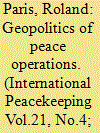

|
|
|
|
|
| Summary/Abstract |
The study of peace operations, which has undergone remarkable growth in recent years, has been paying greater attention to the ‘micro-level’ processes and local dimensions of these missions. This is a welcome development. However, the closer one gets to the local specificities of individual peace operations, the easier it may be to lose sight of the broader patterns of these missions, including how they fit into – and are reflections of – international politics writ large. This article contends that there is a continuing need for this type of ‘macro-level’ research, particularly at a moment of shifting power in the international system. It further argues that a research agenda focusing on the ‘geopolitics’ of peace operations would open up at least three interesting and potentially important avenues of macro-level study.
|
|
|
|
|
|
|
|
|
|
|
|
|
|
|
|
| 8 |
ID:
102348
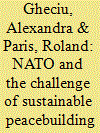

|
|
|
|
|
| Publication |
2011.
|
| Summary/Abstract |
This piece introduces the concept of sustainable peacebuilding and briefly
examines the growing involvement of NATO in peacebuilding operations.
It also previews the empirical articles in this special section, explaining how
they advance our understanding of the challenges faced by NATO in its
peacebuilding efforts.
|
|
|
|
|
|
|
|
|
|
|
|
|
|
|
|
| 9 |
ID:
103253
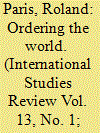

|
|
|
|
|
| Publication |
2011.
|
| Summary/Abstract |
The gap between academic research and policymaking in international relations (IR) is much lamented but poorly understood. Much of what we know about the gap is based on personal anecdotes, untested assumptions, and simplistic conceptions of what counts as policy influence. Using the literature on fragile states as a window into the research-policy interface, this article finds little evidence of scholarship directly influencing policies through specific recommendations and findings. However, academic ideas in this field appear to have important indirect effects on international policy actors - namely, by helping to define and refine understandings of state fragility as a policy problem and by informing the development of operational frameworks for responding to this problem - even though the actors themselves may not be entirely aware of such conceptual influences.
|
|
|
|
|
|
|
|
|
|
|
|
|
|
|
|
| 10 |
ID:
140845
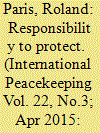

|
|
|
|
|
| Summary/Abstract |
Before I reply to each of the commentaries, allow me to explain why I wrote the article in the first place. Like many people, I was fascinated by the Libya intervention of 2011 and the surrounding debates, including the quite polarized assessments of the intervention's implications for the Responsibility to Protect (R2P). Some observers wrote that the operation was a triumph for R2P and represented its successful ‘coming of age', while others said it heralded the doctrine's demise. Both of these positions were unsatisfying, for three reasons. First, there seemed to be evidence of both success and failure in the Libya mission, which suggested that many defenders and critics of R2P were overstating their case. Second, these polarized positions deflected attention away from the ways in which elements of success and failure might be interconnected and perhaps even inseparable from each other. Finally, many of the analyses dwelt on the particular circumstances of the Libya operation without considering the underlying strategic logic of this type of mission, or the assumed relationship between the interveners’ actions and the desired outcomes. I therefore set out to examine the assumptions of preventive humanitarian intervention and to understand their relationship to R2P.
|
|
|
|
|
|
|
|
|
|
|
|
|
|
|
|
| 11 |
ID:
135762
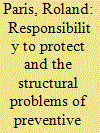

|
|
|
|
|
| Summary/Abstract |
While the normative and legal aspects of the Responsibility to Protect (R2P) doctrine have been explored in great detail, scholars have largely overlooked the more practical question of whether and how international military action can avert mass atrocities. To shed light on this question, this article investigates the ‘strategic logic’ of preventive humanitarian intervention, or the assumed link between external military action and the desired outcome of preventing or stopping mass killing. It contends that there are five fundamental and seemingly irremediable tensions in this logic, all of which cast doubt on the feasibility of preventive humanitarian intervention and on the long-term prospects of R2P.
|
|
|
|
|
|
|
|
|
|
|
|
|
|
|
|
| 12 |
ID:
172830
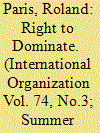

|
|
|
|
|
| Summary/Abstract |
A principal theme of international relations scholarship following the Cold War was the apparent erosion of state sovereignty caused by globalization's integrative effects and the proliferation of international institutions and networks. In recent years, however, scholars have noted a reverse trend: the reassertion of traditional, or Westphalian, state sovereignty. By contrast, I highlight another recent trend that has gone largely overlooked: the reaffirmation of older “extralegal” and “organic” versions of sovereignty by three of the world's most powerful states—Russia, China, and the United States. After tracing the genealogy of these older concepts, I consider how and why they have gained prominence in the official discourse of all three countries. I also explore the implications of this shift, which not only illustrates the importance of “norm retrieval” in international affairs, but also raises questions about the foundations of international order. Contrary to Westphalian sovereignty, which emphasizes the legal equality of states and the principle of noninterference in domestic affairs, the extralegal and organic versions offer few constraints on state action. If anything, they appear to license powerful states to dominate others.
|
|
|
|
|
|
|
|
|
|
|
|
|
|
|
|
| 13 |
ID:
095612
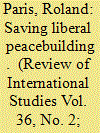

|
|
|
|
|
| Publication |
2010.
|
| Summary/Abstract |
Liberal peacebuilding has become the target of considerable criticism. Although much of this criticism is warranted, a number of scholars and commentators have come to the opinion that liberal peacebuilding is either fundamentally destructive, or illegitimate, or both. On close analysis, however, many of these critiques appear to be exaggerated or misdirected. At a time when the future of peacebuilding is uncertain, it is important to distinguish between justified and unjustified criticisms, and to promote a more balanced debate on the meaning, shortcomings and prospects of liberal peacebuilding.
|
|
|
|
|
|
|
|
|
|
|
|
|
|
|
|
| 14 |
ID:
140104
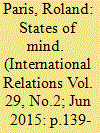

|
|
|
|
|
| Summary/Abstract |
How do foreign actors involved in ‘regime change’ decide which kinds of domestic governance structures to promote in place of the regimes they have deposed? Most of the literature on foreign-imposed regime change assumes that interveners make such decisions based on rational calculations of expected utility. This article, by contrast, contends that interveners are predisposed to promote political arrangements that correspond to their own governance ‘schemas’, or taken-for-granted assumptions about the nature of political authority. These patterns are examined in relation to the US-led regime-change invasions of Afghanistan and Iraq. In both cases, the interveners appeared to be guided – and partially blinded – by their own governance schemas. Yet, if schemas have these effects, they should also be visible in cases where interveners held very different assumptions about governance and the ‘state’ than those held by US officials in Afghanistan and Iraq. To probe this possibility, this article also examines an older, non-Western case of intervention – the Mongol invasion and occupation of northern China in the thirteenth century – a case that yields similar results and highlights the need for additional historical research in this field.
|
|
|
|
|
|
|
|
|
|
|
|
|
|
|
|
| 15 |
ID:
159854
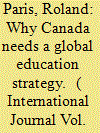

|
|
|
|
|
| Summary/Abstract |
Based on the report of the Study Group on Global Education, this article explains why Canada needs a national strategy aimed at significantly increasing the number of Canadian post-secondary students going abroad for study and work-integrated learning experiences. International education may once have been viewed as an optional luxury. Now it must be seen as a vital tool to equip young Canadians – and Canada – to succeed in a more complex and competitive world.
|
|
|
|
|
|
|
|
|
|
|
|
|
|
|
|
|
|
|
|
|